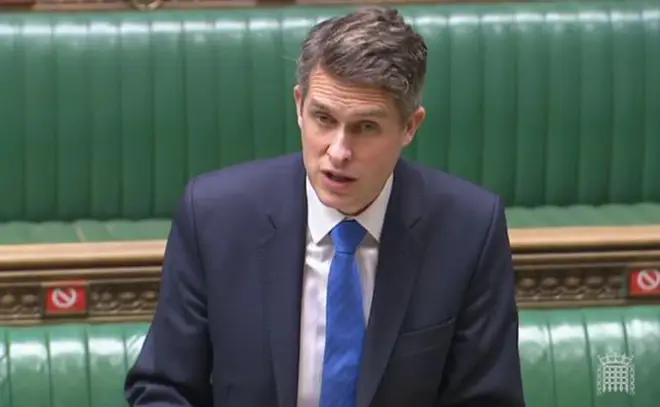
Oli Dugmore 4am - 7am
12 May 2021, 00:10 | Updated: 12 May 2021, 00:15

New legislation will strengthen free speech at English universities to counter "the chilling effect of censorship on campus once and for all", the Education Secretary has said.
Gavin Williamson said holding universities to account on the importance of freedom of speech in higher education was "a milestone moment" and it will protect "the rights of students and academics".
His comments came as the Higher Education (Freedom of Speech) Bill will be introduced in Parliament for the first time on Wednesday.
The Bill - which could see universities face fines if they fail to protect free speech on campus - was among the proposed changes to laws set out in the Queen's Speech on Tuesday.
READ MORE: Queen's Speech: The laws the government will try to pass in 2021
READ MORE: Education Secretary warns against 'silencing' on campuses as he unveils free speech plan
The Department for Education (DfE) said registered universities and colleges in England will be required to promote and defend freedom of speech and academic freedom under the proposed legislation.
The Office for Students (OfS), the higher education regulator in England, would have the power to impose fines on institutions if they breached this condition.
Academics, students or visiting speakers will be able to seek compensation through the courts if they suffer loss due to a breach of the free speech duties.
For the first time, students' unions at universities would be required to take steps to secure lawful freedom of speech for members and visiting speakers under the measures in the Bill.

Free speech is still a big issue campaigner tells LBC
Mr Williamson said: "Our legal system allows us to articulate views which others may disagree with as long as they don't meet the threshold of hate speech or inciting violence.
"This must be defended, nowhere more so than within our world-renowned universities.
"Holding universities to account on the importance of freedom of speech in higher education is a milestone moment in fulfilling our manifesto commitment, protecting the rights of students and academics, and countering the chilling effect of censorship on campus once and for all."
In February, the Education Secretary warned against the "unacceptable silencing and censoring" on campuses as he unveiled the proposed legal measures to protect free speech.
Among the Government's proposals is the appointment of a new Director for Freedom of Speech and Academic Freedom, who will investigate possible breaches of freedom of speech duties and oversee a complaints scheme for students, staff and visiting speakers who have suffered loss due to a breach.
The DfE highlighted some examples from recent years where they said students, staff and invited speakers have felt unable to speak out.
In one, academics signed an open letter in 2017 expressing opposition to Oxford Professor Nigel Biggar's comments that British people should have "pride" as well as shame in the Empire, the DfE said.

'There's no major university free speech issue as Gavin Williamson suggests'
Universities minister Michelle Donelan said: "This Bill will ensure universities not only protect free speech but promote it too. After all, how can we expect society to progress or for opinions to modernise unless we can challenge the status quo?"
A Universities UK (UUK) spokeswoman said: "It is important that the Higher Education (Freedom of Speech) Bill is proportionate - focusing on the small number of incidents - and does not duplicate existing legislation or create unnecessary bureaucracy for universities which could have unintended consequences."
Jo Grady, general secretary of the University and College Union (UCU), said: "This Bill should be seen for what it is: the Government using freedom of speech as a Trojan horse for increasing its power and control over staff and students."
She added: "The truth is that widespread precarious employment strips academics of the ability to speak and research freely, and curtails chances for career development."
An OfS spokesperson said: "Universities and colleges have legal duties to protect both free speech and academic freedom, and their compliance with these responsibilities forms an important part of their conditions of registration with the OfS.
"We will ensure that the changes that result from proposals expressed in (the) Queen's Speech reinforce these responsibilities and embed the widest definition of free speech within the law."